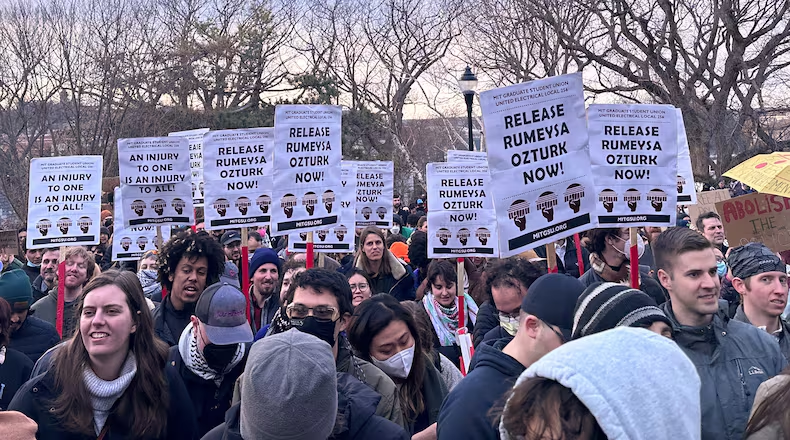Rumeysa Ozturk, a Turkish doctoral student at Tufts University and a Fulbright scholar, was released from a Louisiana immigration detention facility after a federal judge ordered her immediate release on grounds of free speech violations.
Ozturk had been held in custody since March after U.S. Department of Homeland Security (DHS) officials arrested her on the streets of Massachusetts following a Ramadan celebration. Videos of the arrest showed plain-clothed, masked agents taking her away in an unmarked vehicle—an act that sparked national outrage and campus protests.
Her only alleged wrongdoing? Co-authoring an opinion piece in her university’s newspaper that criticized Israel’s war conduct in Gaza. The government accused her of supporting Hamas—a designated terrorist group—but failed to present any evidence of violence or extremist affiliation. During the hearing, the federal judge emphasized that the case against her hinged solely on the article.
“That literally is the case,” said U.S. District Judge William Sessions. “There is no evidence that she has engaged in violence or advocated violence.”
The judge concluded that her First Amendment and due process rights had been violated and that her continued detention risked chilling the speech of millions of non-citizens in America. He ordered that she be released without any travel restrictions, allowing her to return to either Vermont or Massachusetts, where Tufts University is located.
The American Civil Liberties Union (ACLU), which represented Ozturk in court, praised the decision. “Rümeysa can now return to her beloved Tufts community, resume her studies, and begin teaching again,” said Noor Zafar, senior ACLU attorney. “Today’s ruling underscores a vital First Amendment principle: no one should be imprisoned by the government for expressing their beliefs.”
Tufts University expressed satisfaction with the judge’s decision. “We look forward to welcoming her back to campus to resume her doctoral studies,” said a university spokesperson.
Ozturk’s case is not isolated. Other foreign-born students have faced detention for pro-Palestinian activism. Just last week, a judge ordered the release of Mohsen Mahdawi, a Columbia University student and permanent resident, who was detained during a naturalisation interview. Meanwhile, Mahmoud Khalil, a high-profile Palestinian activist and Columbia graduate, remains in detention without formal charges.
The Trump administration defended its actions, stating that “visas provided to foreign students… are a privilege, not a right,” and promised to continue cracking down on non-citizens they deem threats to national security.
This case serves as a chilling example of how immigration enforcement can intersect with political expression, raising serious concerns about the future of First Amendment rights in the US—especially for non-citizens.
Conclusion
Rumeysa Ozturk’s release is a victory for civil liberties advocates and highlights the growing tension between national security policies and free speech protections. As more students and academics face scrutiny for their views on international conflicts, cases like these underscore the importance of legal protections and advocacy from organizations like the ACLU.


